7 low-impact workouts that torch major calories
Lose weight—and go easy on your joints—with these aerobic exercises.
Updated on July 14, 2022
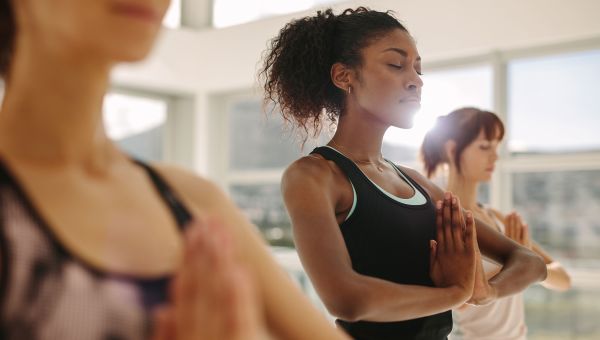
You don’t have to let low back pain, a sore knee, or achy ankles stop you from getting some exercise. Low-impact workouts can actually help. Thy don’t involve much pounding or jumping—and perhaps more importantly, put less strain on muscles and joints.
Moderate aerobic activity can help lower cholesterol, reduce blood pressure, and aid weight loss. Some low impact… Show More
You don’t have to let low back pain, a sore knee, or achy ankles stop you from getting some exercise. Low-impact workouts can actually help. Thy don’t involve much pounding or jumping—and perhaps more importantly, put less strain on muscles and joints.
Moderate aerobic activity can help lower cholesterol, reduce blood pressure, and aid weight loss. Some low impact exercises may improve your posture and flexibility, as well.
Remember to speak with a healthcare provider before beginning any new exercise program. Meanwhile, whether you’re getting over an injury or you want to add some variety to your fitness plan, here are seven low-impact workouts to consider. Your joints will thank you.
Show Less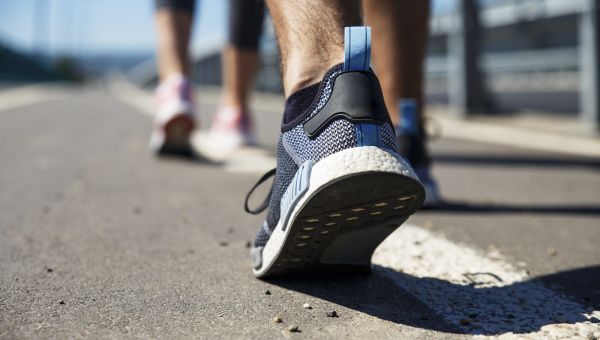
Walking
Appropriate for all age groups, walking may be the most convenient low-impact exercise on the list. It’s easy on your joints and may even keep people with osteoporosis from losing bone mass. But that’s not all. Walking can boost your mood, help you burn calories, strengthen your leg and abdominal… Show More
Appropriate for all age groups, walking may be the most convenient low-impact exercise on the list. It’s easy on your joints and may even keep people with osteoporosis from losing bone mass. But that’s not all. Walking can boost your mood, help you burn calories, strengthen your leg and abdominal muscles, and increase the blood circulation to your joints.
Grab a friend and walk the neighborhood once a day for 30 minutes—you can catch up with one another and get some sunshine at the same time.
Calories burned per hour, based on 160-pound woman: 276 (walking at a speed of 3.5 mph)
Show Less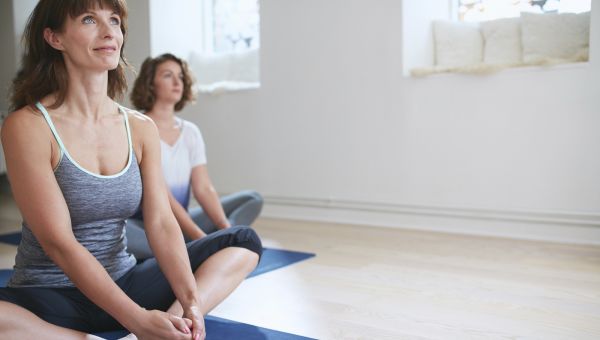
Yoga
The 11 million Americans who do yoga can’t be wrong: This ancient practice of engaging the mind, body, and spirit using postures, breathing techniques, and meditation is known for lowering stress levels.
Yoga can also improve your flexibility and posture, helping you stand taller even after you… Show More
The 11 million Americans who do yoga can’t be wrong: This ancient practice of engaging the mind, body, and spirit using postures, breathing techniques, and meditation is known for lowering stress levels.
Yoga can also improve your flexibility and posture, helping you stand taller even after you leave class. Those suffering from chronic conditions like back pain, arthritis, or carpal tunnel syndrome may notice pain relief while practicing yoga, too.
Find an outdoor class in the park, head to a yoga studio, or try a video online to de-stress and tone up.
Calories burned per hour based on a 160-pound woman: 218 (though this may vary greatly depending on the kind of yoga being practiced)
Show Less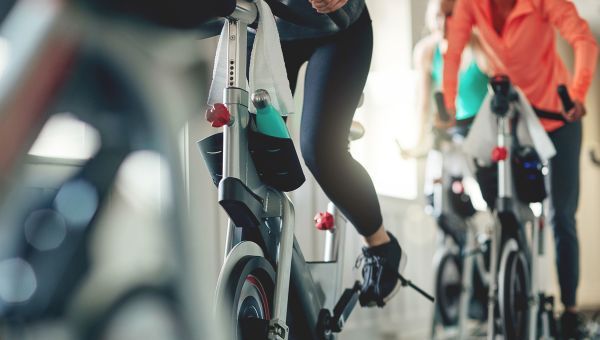
Indoor cycling, biking
Whether you hit the pavement with your road bike or check out a spinning class down the street, you’re likely to work up a sweat.
As long as your bike is set up properly and you have the appropriate shoes, indoor cycling poses little harm to your knees, hips, and ankle joints. There’s no pounding… Show More
Whether you hit the pavement with your road bike or check out a spinning class down the street, you’re likely to work up a sweat.
As long as your bike is set up properly and you have the appropriate shoes, indoor cycling poses little harm to your knees, hips, and ankle joints. There’s no pounding involved thanks to the fluid circular motion that allows you to flex and extend your lower limbs with ease.
Outdoor biking is good for you, too. Assorted terrains make for an automatic interval workout, without all the impact on your lower body. Biking is also family-friendly: Try cycling to the local neighborhood restaurant for dinner on the weekends or load up the bikes and hit the trails one Saturday afternoon.
Calories burned per hour based on a 160-pound woman: 435 (biking at a speed of 10-12 mph)
Show Less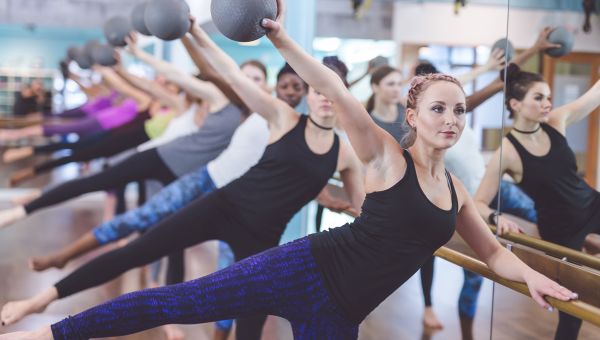
Barre
It depends on what kind of class you attend, but most barre workouts combine ballet-style exercises with yoga-inspired moves. It’s common for routines to involve modest movements targeting smaller muscle groups that may be overlooked during other workouts.
Standing exercises using the ballet barre… Show More
It depends on what kind of class you attend, but most barre workouts combine ballet-style exercises with yoga-inspired moves. It’s common for routines to involve modest movements targeting smaller muscle groups that may be overlooked during other workouts.
Standing exercises using the ballet barre and mat exercises on the floor can tone your core and improve your flexibility, stability, mobility, and balance without putting extra stress on your joints. Barre workouts are low-impact because they involve isometric training—exercises that use your body weight to strengthen joints and boost mobility.
Calories burned per hour based on a 160-pound woman: 200+
Show Less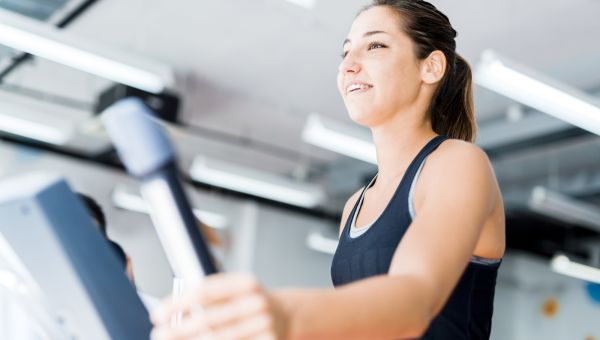
Elliptical workouts
Some say repetitive elliptical movements don’t yield results. But that’s not the case. Elliptical machines can provide a safe and effective workout, especially if you’re nursing a joint or muscle injury.
Elliptical workouts prevent all of your body weight from striking the ground, which means you’… Show More
Some say repetitive elliptical movements don’t yield results. But that’s not the case. Elliptical machines can provide a safe and effective workout, especially if you’re nursing a joint or muscle injury.
Elliptical workouts prevent all of your body weight from striking the ground, which means you’ll increase your heart rate without putting much stress on your knees, hips, and lower back.
Bonus: Some elliptical machines have upper body handles that allow you to work your arms at the same time. Try built-in programs with steeper inclines for a more intense workout.
Calories burned per hour based on 160-pound woman: 365 (moderate effort)
Show Less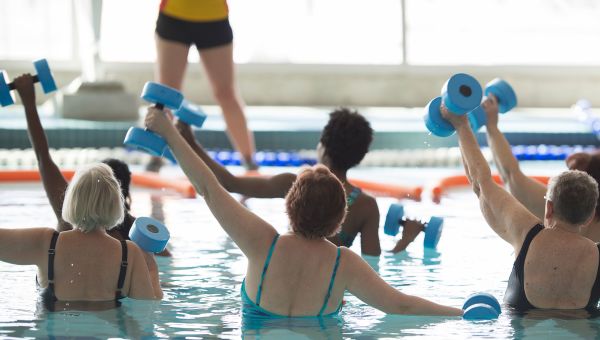
Water-based exercises
Water exercises like swimming or pool aerobics can help people of all ages, as well as people living with a variety of health conditions.
For people with arthritis, these exercises can improve mobility and help relieve joint pain and stiffness. Post-menopausal women who practice water exercises may… Show More
Water exercises like swimming or pool aerobics can help people of all ages, as well as people living with a variety of health conditions.
For people with arthritis, these exercises can improve mobility and help relieve joint pain and stiffness. Post-menopausal women who practice water exercises may experience improved bone and muscle strength and fewer falls, as well. And for older adults, practicing water-based activities can help slow the onset of disability.
Try your local gym’s water aerobics classes or hit the lap pool for a relaxing solo workout.
Calories burned per hour based on a 160-pound woman: 290 for water aerobics; 218-726 for swimming
Show Less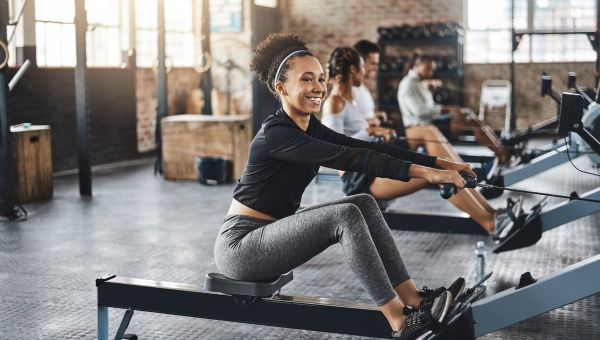
Rowing
The rowing machine—also known as an ergometer—is a piece of equipment you’ve likely seen at the gym but may have passed up. It might be time to put it to use, however, because doing so can help you tone up and burn calories. This type of workout focuses on the upper body and legs mostly, but is… Show More
The rowing machine—also known as an ergometer—is a piece of equipment you’ve likely seen at the gym but may have passed up. It might be time to put it to use, however, because doing so can help you tone up and burn calories. This type of workout focuses on the upper body and legs mostly, but is considered a total-body workout.
Because it’s an impact-free and non-weight-bearing workout, your joints won’t be strained—a huge plus for anyone with joint pain or other orthopedic concerns.
Make sure to use proper form, though: Ask a trainer or employee at your local gym for some pointers to be sure you’re doing the moves correctly.
Calories burned per hour based on a 160-pound woman: 511 (moderate effort)
Show Less
Arthritis Foundation. 12 Benefits of Walking. 2022. Accessed July 13, 2022.
Chavarrias M, Carlos-Vivas J, et al. Health Benefits of Indoor Cycling: A Systematic Review. Medicina (Kaunas). 2019 Aug 8;55(8):452.
American Heart Association. Why is Walking the Most Popular Form of Exercise? January 10, 2017. Accessed July 13, 2022.
American Council on Exercise. ACE Study Evaluations Health Benefits of Aerial Yoga. Febryary 17, 2016. Accessed July 13, 2022.
American Council on Exercise. Is Yoga Right for You? January 28, 2009. Accessed July 13, 2022.
American Osteopathic Association. Maintaining a regular yoga practice can provide physical and mental health benefits. 2022. Accessed July 13, 2022.
Acquaviva JC and Roy BA. Mountain Biking, ACSM's Health & Fitness Journal. November/December 2015. Volume 19, issue 6 - p 7-8.
The Bar Method. General Questions. 2022. Accessed July 13, 2022.
Mayo Clinic. Are elliptical machines better than treadmills for basic aerobic workouts? June 19, 2020. Accessed July 13, 2022.
Kaplan Y, Witvrouw E, Nyska M, et al. Referent body weight values in over ground walking, over ground jogging, treadmill jogging, and elliptical exercise. British Journal of Sports Medicine 2014;48:616.
Lu TW, Chien HL, Chen HL. Joint loading in the lower extremities during elliptical exercise. Medicine & Science in Sports Exercise. 2007 Sep;39(9):1651-8.
Burnfield JM, Shu Y, et al. Similarity of joint kinematics and muscle demands between elliptical training and walking: implications for practice. Physical Therapy. 2010 Feb;90(2):289-305.
Centers for Disease Control and Prevention. Healthy Swimming: Health Benefits of Swimming. February 18, 2022. Accessed July 13, 2022.
Sato D, Kaneda K, et al. The water exercise improves health-related quality of life of frail elderly people at day service facility. Quality of Life Research. 2007 Dec;16(10):1577-85.
Mayo Clinic. Exercise for weight loss: Calories burned in 1 hour. December 7, 2021. Accessed July 13, 2022.
Harvard Health Publishing. Calories burned in 30 minutes for people of three different weights. March 8, 2021. Accessed July 13, 2022.
Mayo Clinic. Metabolism and weight loss: How you burn calories. November 10, 2020. Accessed July 13, 2022.
More On


video

article

slideshow


video


video
